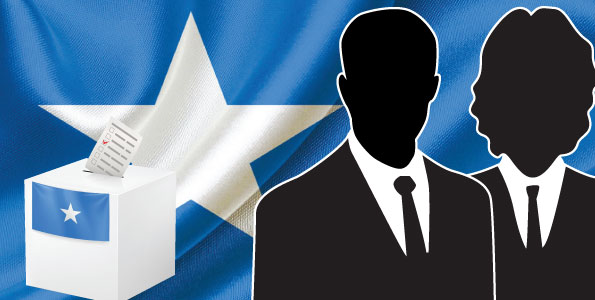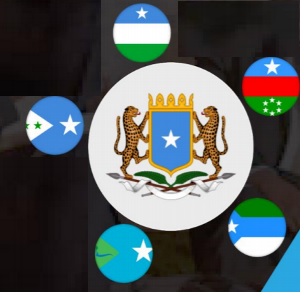By Osman H. Yusuf
Part I – Somalia– Politics, Federal Government and Member States
As 2020/2021 elections approach disagreements between the Federal government, Fed Member States and opposition parties are at an all-time high and people wonder that if an agreeable compromise is not reached in the coming months that opportunity of holding the election on schedule will be squandered and the limited stability and order that the country is now enjoying may be short-lived. There is still time for the stakeholders to come to the negotiation table and iron out their differences for the sake of the national interest.

Political parties are not yet in a campaign mode for the election and are expected to make their platform known to the public when remaining political differences are sorted out and the Electoral Commission gives the green light. Hopefully, the next election based on ‘one person, one vote’ and on 4.5 formula will produce candidates with vision and integrity who put the national interests before their personal interests. From the perspective of the recent past election, It was shocking to observe chauvinistic attitudes and unpatriotic behavior on the part of some elected representatives who also showed extreme clan loyalty vigorously pursuing their personal ambitions to gain power and influence, not to mention wealth, in direct violation of the solemn oath they have taken to serve the national interest and be faithful to the pledge of allegiance to the Republic.
It should be highlighted that the electoral system based on clan power-sharing was far from having been hailed as satisfactory and has not been welcomed by large segments of the people nor did it meet the expectations of the international community – Somalia’s partners for rebuilding the country – but, ironically, it did serve as a last resort to rid of a long standing dispute among warrying factions since the 1990s. Various attempts were made at that time by clan elders and militia leaders to find a compromise on power sharing as each group was jockeying for a bigger junk of power and ultimately they came up with the 4.5 clan-based formula where members of parliament would be selected or hand-picked by clan chiefs on that basis under the auspices of the United Nations. Consequently, the following transitional governments formed since then had to struggle to ensure functioning governments until the transition was over and a full-fledged government came to office in 2012 but it deliberately stopped short of moving the country beyond the 4.5 formula and instead made it the basis for the 2016 indirect election despite strong opposition.
Given that unhappy experience with past elections the country, while still hostage to 4.5 clan power sharing, is now looking forward to holding its first competitive election under a multi-party system where parties have yet to show their clout as they become fully operational in the coming months based on the recently enacted Laws on elections and political parties, a major achievement of the Federal government. For the sake of the public good, the Fed government and other stakeholders are expected to take the conduct of the country’s affairs to a higher level of civility and patriotism and move beyond the current level of discord.
The nation expects the stakeholders to contribute, in a constructive manner, to the important issues on the table in order to overcome the challenges facing the nation at this stage of recovery and reconstruction. Acting in good faith and setting aside trivial clan or personal differences for the sake of a lasting peace and true reconciliation will surely benefit the whole country and enhance its image, prestige and credibility in the world. The Federal Government has the responsibility to steer the country towards genuine democracy and take measures to further strengthen the adopted federal system of government, especially now that the country has emerged from decades of difficult times and lengthy negotiations.
It is to be mentioned that in the early stages of practicing a democracy people are excited and eager to learn about it and appreciate the outcome but when that the process is abused they become disappointed and critical of the governing body and the ensuing blame game only exacerbates the situation and ignites relational frictions between those politically involved. Then, as criticism spreads also through the social media and the country is mired in an endless dispute, the government should consider such events as democracy in action, not disruptive to public order and try to come to terms with reality, giving a chance to a constructive dialogue instead of resorting to arbitrary measures which further incite anger and frustration among the people.

The Federal Government’s relationship with its member States in the past years has been on a rocky path since the last consultation between the two institutions miserably failed. It is said that the Federal government feels that some member states have crossed the line and that they are running parallel governments contradicting Fed Government policies and avoiding prior communication with it whereas the states accuse the Federal Government of wanting to manipulate their relationship, rejecting consultation on important issues and withholding of funds due to them. Thus, the current impasse between the Fed and States hinges upon the ambiguity of the draft constitution or laws where they may still be clauses on which they differ that need to be timely dealt with.
Moreover, it has become an open policy of the Federal Government to intervene in the election and formation of member states’ constitutional institutions despite the opposition’s demand for a ‘hands-off’ approach to let this embryonic democratic exercise find its natural course and enhance the people’s trust as they are experiencing it for the first time since the 1970s. It is apparently clear that the Federal framework needs to be finally fixed particularly with respect to the respective competencies of the Federal government and member states. Cooperation and consultation are the best venue to agree on issues of national interest bearing in mind that difficult times call for bold decisions or reasonable compromises in order to avert regrettable consequences. People believe that the international community led by the UN has at least an advisory role on the contentious issues and hopefully it is helping to move the process forward.
Analysts say that there is no provision in the Federal constitution for the government to intervene in States’ elections except for assisting them with logistics and security. It is, therefore, inappropriate for the Federal Government to manipulate the State election and its democratic process by engineering it and eventually installing regional State administrations amenable to its policy. Since the outcome of the previous indirect general election of members of parliament was highly disappointing, people expect that the blunders and excesses committed in that election will not be repeated for the forthcoming general election.
If those misguided actions return it will be tantamount to a recipe for disaster which may cost the country years of relative peace and stable political environment and the generous assistance of the international community. Undoubtedly, the nation embraced the principle of a multiple party system ensuring ‘one person one vote’ election and is excited about it eagerly awaiting its successful implementation to prove to the world that Somalia stands again on its feet.
Osman H. Yusuf
Email: [email protected]
We welcome the submission of all articles for possible publication on WardheerNews.com. WardheerNews will only consider articles sent exclusively. Please email your article today . Opinions expressed in this article are those of the author and do not necessarily reflect the views of WardheerNews.
WardheerNew’s tolerance platform is engaging with diversity of opinion, political ideology and self-expression. Tolerance is a necessary ingredient for creativity and civility.Tolerance fuels tenacity and audacity.
WardheerNews waxay tixgelin gaara siinaysaa maqaaladaha sida gaarka ah loogu soo diro ee aan lagu daabicin goobo kale. Maqaalkani wuxuu ka turjumayaa aragtida Qoraaga loomana fasiran karo tan WardheerNews.
Copyright © 2024 WardheerNews, All rights reserved


